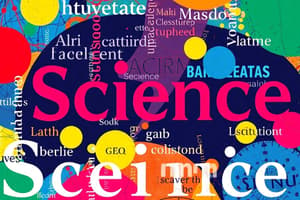Podcast
Questions and Answers
What is one reason why scientific terms become increasingly difficult to understand?
What is one reason why scientific terms become increasingly difficult to understand?
- Because they are only taught in universities
- Because it becomes more difficult for brain neurons to make new connections (correct)
- Because scientists use complex diagrams to explain them
- Because they are based on English language
What is the meaning of the prefix 'apo-' in the term apoptosis?
What is the meaning of the prefix 'apo-' in the term apoptosis?
- Falling off
- Cell fragmentation
- Cellular death
- Separating (correct)
What language is used universally in science for classifying living organisms?
What language is used universally in science for classifying living organisms?
- French
- Latin (correct)
- Greek
- English
What is the term for the study of birds?
What is the term for the study of birds?
What is an example of a Greek scientific term used in biology?
What is an example of a Greek scientific term used in biology?
Why are Greek and Latin used in scientific terminology?
Why are Greek and Latin used in scientific terminology?
What is the meaning of the root word 'bios' in the term biology?
What is the meaning of the root word 'bios' in the term biology?
What is the term for the process by which plants use sunlight and water to produce their own nutrients?
What is the term for the process by which plants use sunlight and water to produce their own nutrients?
What is necessary to understand scientific terminology?
What is necessary to understand scientific terminology?
What is the meaning of the suffix '-osis' in the term phagocytosis?
What is the meaning of the suffix '-osis' in the term phagocytosis?
What is phagocytosis defined as?
What is phagocytosis defined as?
Which of the following is NOT a primary unique study style?
Which of the following is NOT a primary unique study style?
What is the main characteristic of a holistic learner?
What is the main characteristic of a holistic learner?
In the taxonomy of living things, what is the largest grouping?
In the taxonomy of living things, what is the largest grouping?
What type of learner benefits from laboratory components of classes?
What type of learner benefits from laboratory components of classes?
Flashcards are hidden until you start studying
Study Notes
Science Terminology Challenges
- Science vocabulary becomes increasingly difficult to pronounce and understand, especially as one studies scientific topics in greater detail.
- Many scientific terms are rooted in different languages, including Greek and Latin, which are used universally in science.
Greek and Latin in Science
- The Greek alphabet has influenced scientific terminology due to the pioneering scientists and researchers being Greek.
- Latin was an international language at the time of scientific discovery within Europe and the extending western world, hence its use in scientific terms.
- Examples of Greek and Latin in science vocabulary include apoptosis, biology, and centrifugal.
Dissecting Science Vocabulary
- Apoptosis: a term describing cellular death, derived from Greek, meaning "falling off".
- Prefix "apo-" means separating.
- Root "-ptosis" means falling off.
- Centrifugal: a term meaning the tendency to move away from the center of an object or entity, derived from Latin.
- Root "centrum" means center.
- Suffix "-fugal" means to flee.
Common Science Terms
- Biology: the study of life or living organisms, derived from Greek.
- Hydrocephalus: a medical condition where fluid is found in the brain, derived from Greek.
- Photosynthesis: the process by which plants use sunlight and water to produce their own nutrients.
- Hydrogenation: the addition of hydrogen in a chemical reaction.
- Ornithology: the study of birds.
- Hypothesis: an educated explanation for a certain phenomenon.
- Ecology: the study of the ecosystem or environment.
- Heterotroph: an organism that relies on external sources of nutrients.
- Autotroph: an organism that makes its own nutrients via chemical processes.
Morphemes of Common Science Terms
- Centrifugal: a combination of Latin roots and suffixes, meaning to flee the center.
- Biology: a combination of Greek root "bios" meaning life and suffix "-ology" meaning the study of.
- Hydrocephalus: a combination of Greek prefix "hydro-" meaning water and suffix "-cephalus" meaning head.
Word Parts
- Roots: the base word for a new word, e.g., "sleep" in the word "sleeping".
- Prefixes: added to the beginning of a word, e.g., "un-" in the word "unhappy".
- Suffixes: added to the end of a word, e.g., "-ful" in the word "helpful".
Unique Study Styles
- Auditory or Verbal: learning through hearing new information.
- Visual: learning through seeing new information.
- Hands-on: learning through performing tasks or experiments.
Approaches to Learning
- Holistic: grouping new concepts with previously learned ideas.
- Analytical: dividing concepts into small subsections.
Studying That Suits You
Use AI to generate personalized quizzes and flashcards to suit your learning preferences.




